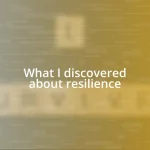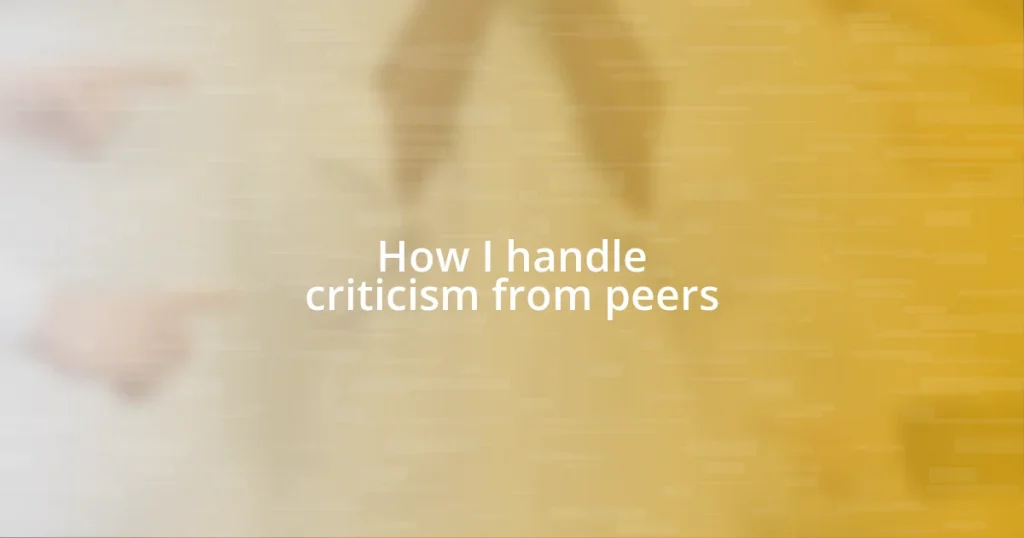Key takeaways:
- Effective leadership is built on listening, authenticity, and adaptability, creating an environment where team members feel valued and empowered.
- A leadership mindset requires self-awareness, resilience, and an embrace of feedback to foster continuous growth and inspire teams during challenges.
- Mentorship plays a crucial role in developing others, highlighting the importance of emotional connections and fostering a holistic growth mindset beyond professional skills.
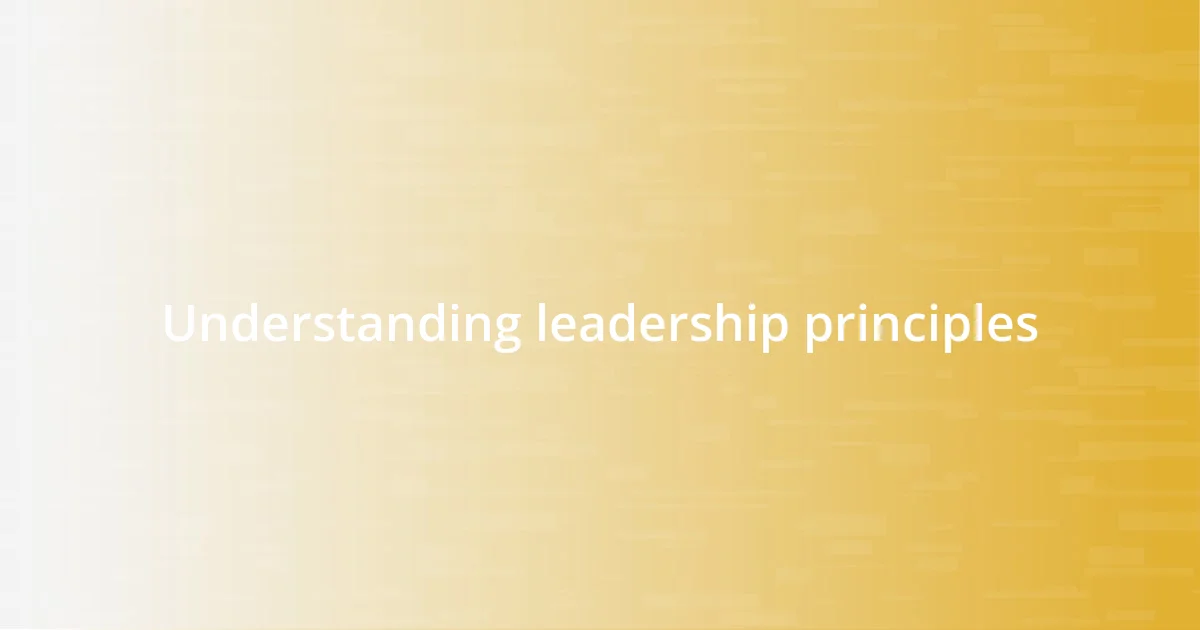
Understanding leadership principles
Understanding leadership principles involves recognizing the core values that define effective leadership. I remember my first experience leading a small team at work; I was overwhelmed but learned quickly that listening was fundamental. Have you ever noticed how a simple act of listening can empower others? It truly fosters an environment where team members feel valued and heard.
As I’ve explored leadership principles further, one idea has repeatedly struck me: authenticity is crucial. I once worked under a manager who was transparent about her challenges. This honesty created trust and encouraged us to share our ideas freely. Have you ever felt more motivated in a team where your leader was genuinely themselves? I certainly did, and it taught me that vulnerability can be a powerful leadership tool.
Lastly, embracing adaptability stands out as a key principle in my learning journey. There was a significant project where the initial plan had to pivot completely due to unforeseen challenges. I saw firsthand how flexibility and a positive attitude can lead a team through uncertainty. How do you respond to change when you’re in a leadership role? I’ve found that being open to new directions often reveals unexpected opportunities for growth.

Developing a leadership mindset
Developing a leadership mindset begins with self-awareness. Diving deep into my strengths and weaknesses was initially uncomfortable, but this journey helped me identify how I can lead authentically. Reflecting on my experiences, I remember a time when I stumbled in front of my team. Instead of hiding my mistake, I addressed it openly, which not only built rapport but also created a safe space for others to share their own challenges. Have you ever found that honesty can build real connections?
With self-awareness comes the willingness to grow. I’ve always embraced feedback, viewing it as an opportunity rather than criticism. For instance, receiving constructive criticism after a presentation was tough at first, but it motivated me to refine my skills. Isn’t it interesting how feedback can transform a leader’s approach? By actively seeking input, I not only enhanced my capabilities but also demonstrated to my team that growth is a continuous process worth pursuing.
A crucial component of a leadership mindset is fostering resilience. During a particularly challenging project, I faced setbacks that threatened to derail our progress. However, by maintaining a positive outlook and focusing on solutions rather than problems, I saw my team rally together. Have you ever noticed how resilience can inspire those around you? It reinforced to me that a leader’s response to adversity can set the tone for the entire team.
| Aspect | Description |
|---|---|
| Self-Awareness | Understanding personal strengths and weaknesses to lead authentically. |
| Growth Mindset | Embracing feedback as a tool for continuous improvement. |
| Resilience | Maintaining a positive outlook in the face of challenges to inspire the team. |

Identifying personal leadership strengths
Identifying personal leadership strengths can be a revealing journey. I vividly remember when I took an online assessment to explore my leadership style. The results highlighted my natural inclination towards empathy and collaboration. It was eye-opening to recognize that these traits allowed me to create a supportive atmosphere where team members felt comfortable sharing ideas. Have you ever had a moment where a simple reflection on your strengths brought clarity to your leadership approach?
To pinpoint your leadership strengths, consider evaluating the following aspects:
- Empathy: Do you genuinely care about the needs and feelings of others?
- Decision-Making: Can you make tough choices while considering the broader impact on your team?
- Communication: Are you able to convey ideas clearly and effectively, fostering an open dialogue?
- Adaptability: How do you respond to unforeseen changes within your team or projects?
- Influence: Do others naturally gravitate toward your ideas and leadership style?
Reflecting on these questions can guide you to understand your unique strengths as a leader. Each realization adds another layer to your leadership journey, guiding you towards a more authentic and impactful presence.
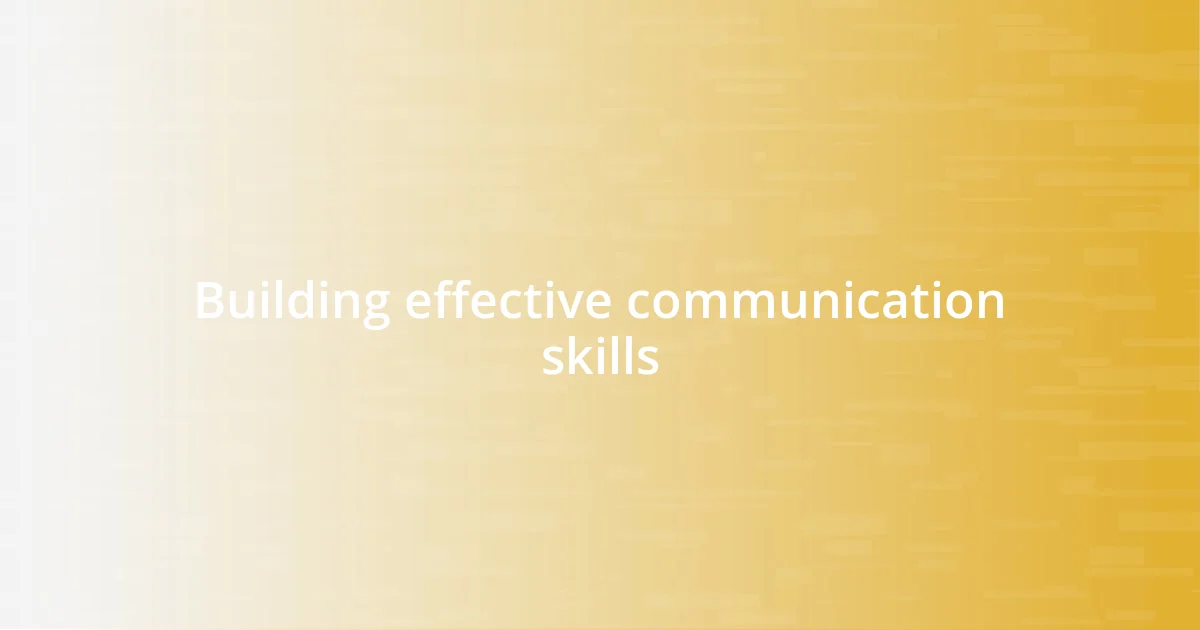
Building effective communication skills
Building effective communication skills is a game-changer for anyone aspiring to be a leader. In my experience, I found that the ability to listen actively often speaks louder than the words I might say. During team meetings, I made it a point to not just hear but genuinely understand my colleagues’ perspectives. Have you ever noticed how tuning in closely to someone can reveal layers of insight that might otherwise slip by?
I vividly recall a time when a team member approached me with concerns about an ongoing project. Instead of brushing it off, I created a space for dialogue. It was incredible to see how that simple act of listening not only helped resolve the issue but also built trust among our team. It made me realize that open communication fosters an environment where everyone feels valued. Isn’t it amazing how a few minutes of sincere conversation can transform the dynamic of a group?
Moreover, expressing ideas clearly is just as crucial as listening. I remember preparing for a pivotal presentation where the stakes felt high. To convey my message effectively, I practiced not just what I would say but how I would say it, focusing on clarity and engagement. The feedback was overwhelmingly positive, and it reinforced my belief that authentic communication can motivate and inspire others to rally behind a common vision. How do you convey your own thoughts so they resonate with those around you?
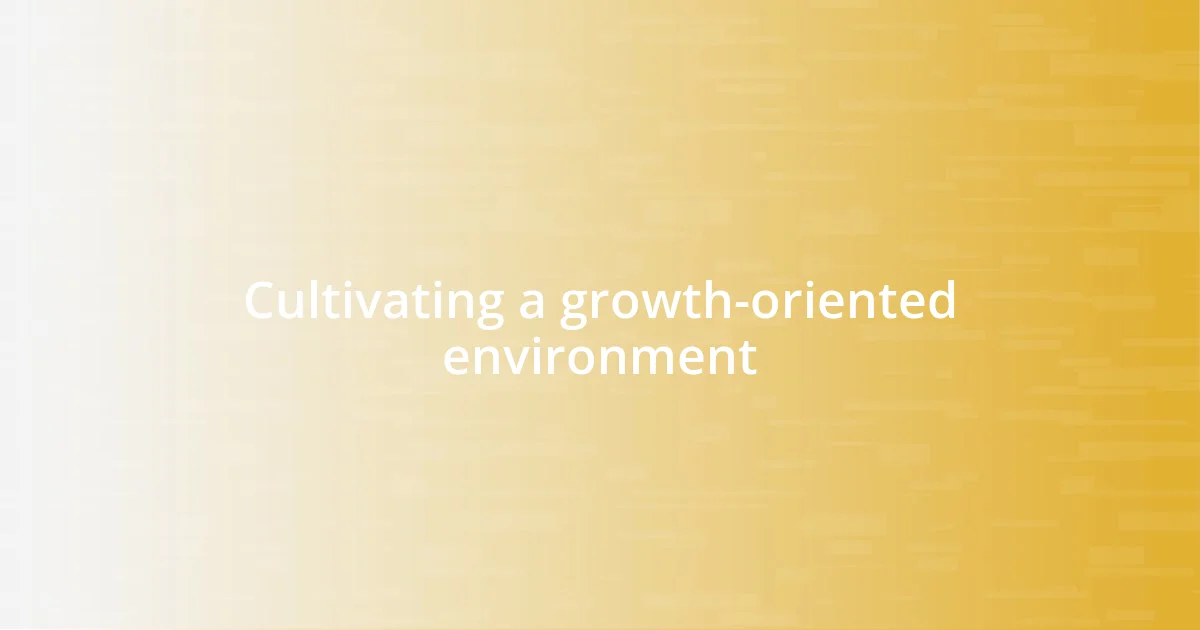
Cultivating a growth-oriented environment
Creating a growth-oriented environment is essential for nurturing potential within a team. I remember initiating a weekly brainstorming session where everyone could share ideas, no matter how unconventional. The first few meetings were a bit tentative; however, as I encouraged a culture of experimentation, it was amazing to witness how ideas blossomed. Have you ever been pleasantly surprised by the ingenuity that can surface when people feel safe to express themselves?
I also learned the value of celebrating failures along the way. One time, a project didn’t go as planned despite our hard work. Rather than assigning blame, I facilitated a discussion focused on what we could learn from the experience. This approach not only eased the tension but also fostered a sense of collective ownership and resilience. In your journey, how have you reframed setbacks as stepping stones to growth?
Moreover, providing constructive feedback is key to developing individuals within a team. I recall having a one-on-one with a team member who was struggling with deadlines. Instead of criticizing, I worked with them to set realistic goals and offered support. This simple shift strengthened our relationship and allowed them to thrive. What strategies have you tried to empower those around you in their growth?
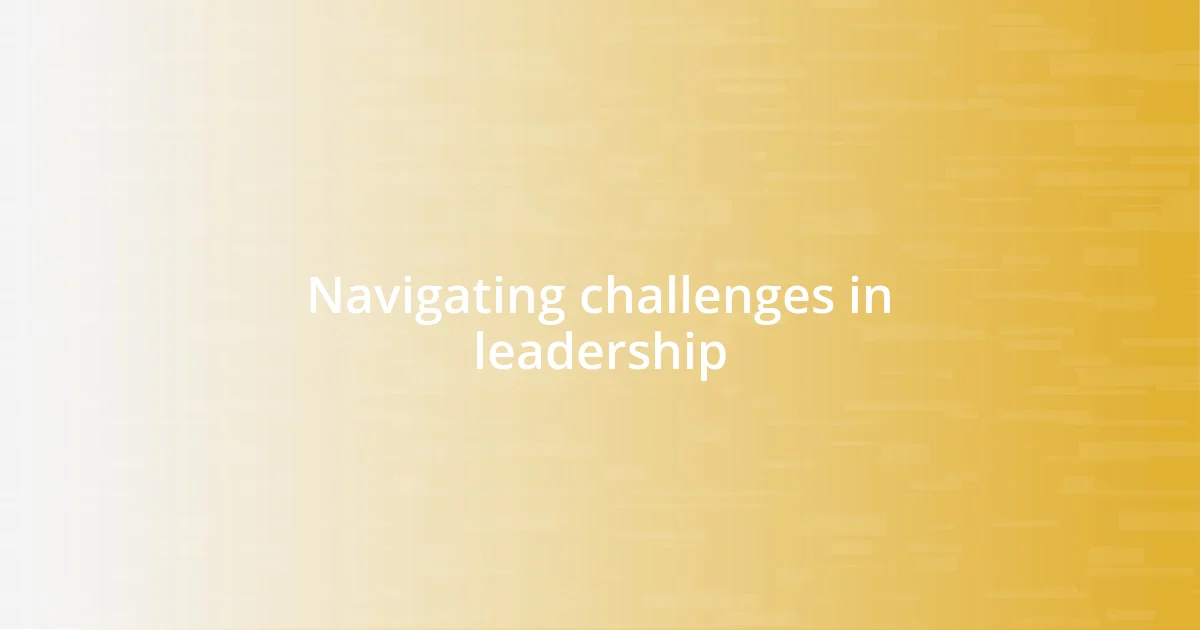
Navigating challenges in leadership
Navigating challenges in leadership often feels like traversing a minefield; one misstep can lead to significant repercussions. I recall a particularly tough decision-making moment when we had to pivot strategy mid-project. It was stressful, especially when team members were looking to me for guidance. In those moments, I found that transparency was my best ally. Sharing the reasoning behind my decisions helped alleviate uncertainty and fostered a sense of collective purpose. Have you ever felt that the weight of your choices rests heavily on your shoulders?
There was a time when conflict erupted between two team members, and I felt the tension ripple through the entire group. Rather than avoiding the issue, I scheduled a mediation session. I approached it with empathy, encouraging each party to voice their feelings. Witnessing that breakthrough moment when they found common ground was rewarding. It reinforced my belief that navigating challenges isn’t just about finding solutions; it’s also about nurturing relationships. How do you approach conflicts within your teams?
Additionally, I’ve faced significant challenges during transitions, like when our team underwent a departmental restructuring. The initial uncertainty was palpable. I made it a priority to check in regularly with my team, ensuring they felt supported despite the changes. This openness helped foster resilience and allowed us to face the transitions as a cohesive unit. How do you help your team navigate through uncertain times while maintaining morale?
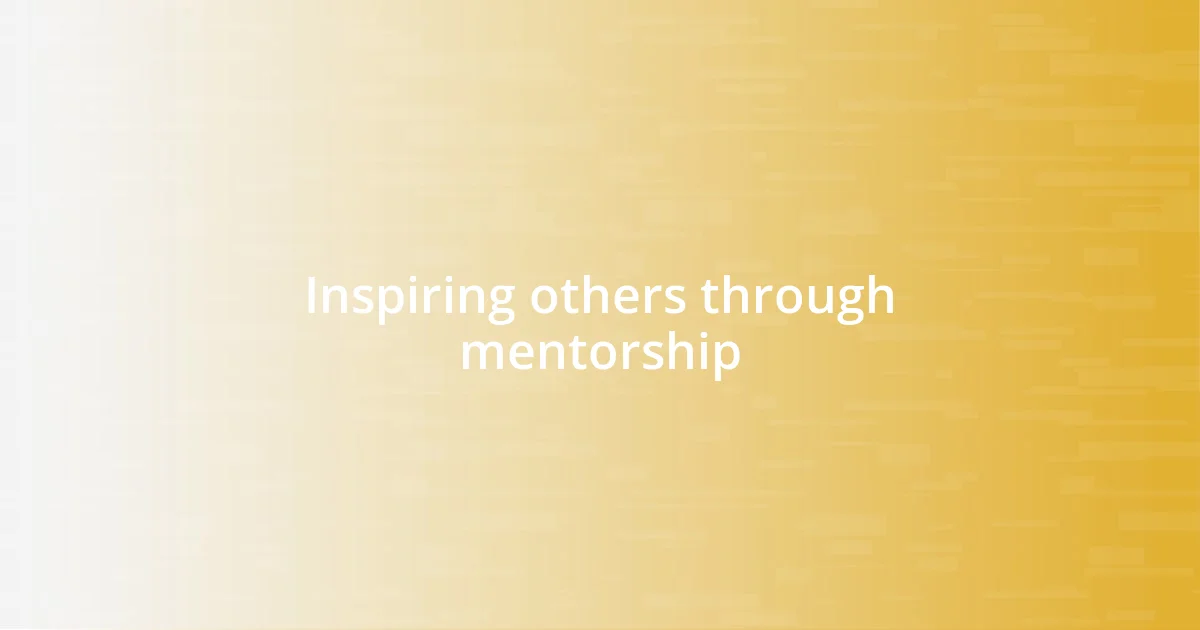
Inspiring others through mentorship
Mentorship has a profound impact on inspiring others, and I genuinely believe it’s one of the most rewarding parts of being a leader. I remember a young colleague, eager yet uncertain, who approached me for guidance on their career path. We began meeting regularly, and I not only shared my experiences but encouraged them to envision their potential. Witnessing their transformation was exhilarating; it reminded me of how powerful a little encouragement can be. Have you ever seen someone’s confidence bloom just because you took the time to invest in them?
The emotional connection that develops during mentorship can be transformative. I once mentored a team member who grappled with self-doubt. Together, we worked on a project that pushed them out of their comfort zone. When they presented our work, the pride in their eyes was unmistakable. It struck me that fostering belief in someone can often ignite their own drive for excellence. Isn’t it amazing how creating that space can leave a lasting imprint on someone’s journey?
Moreover, mentorship extends beyond professional guidance; it’s about fostering a holistic growth mindset. I recall introducing my mentees to the idea of lifelong learning through informal book clubs and shared experiences. Watching them engage intellectually and personally reinforced the idea that mentorship shouldn’t just focus on skills but also inspire a passion for continuous development. In your own journey, how have you embraced the opportunity to learn both from and alongside those you mentor?








